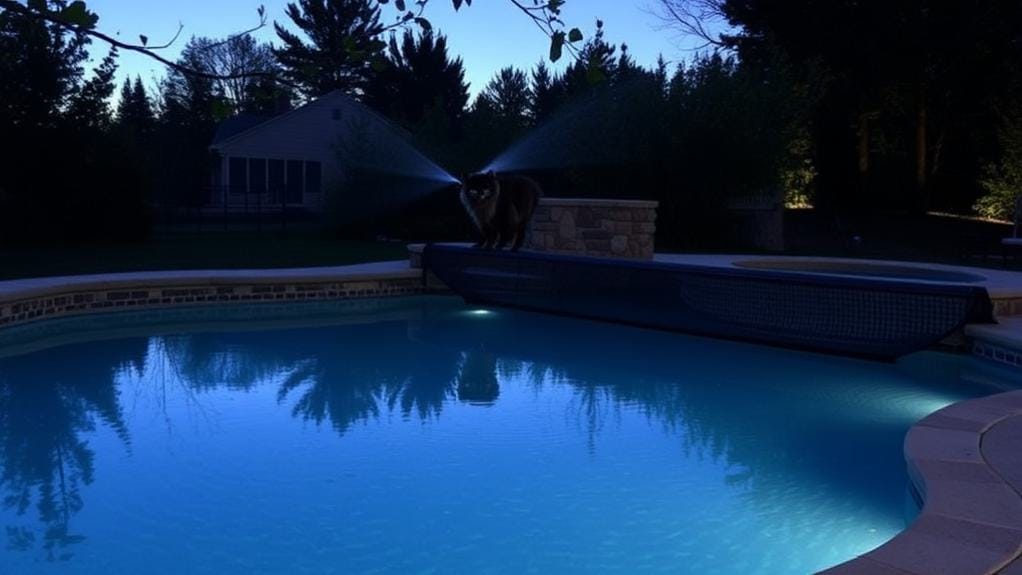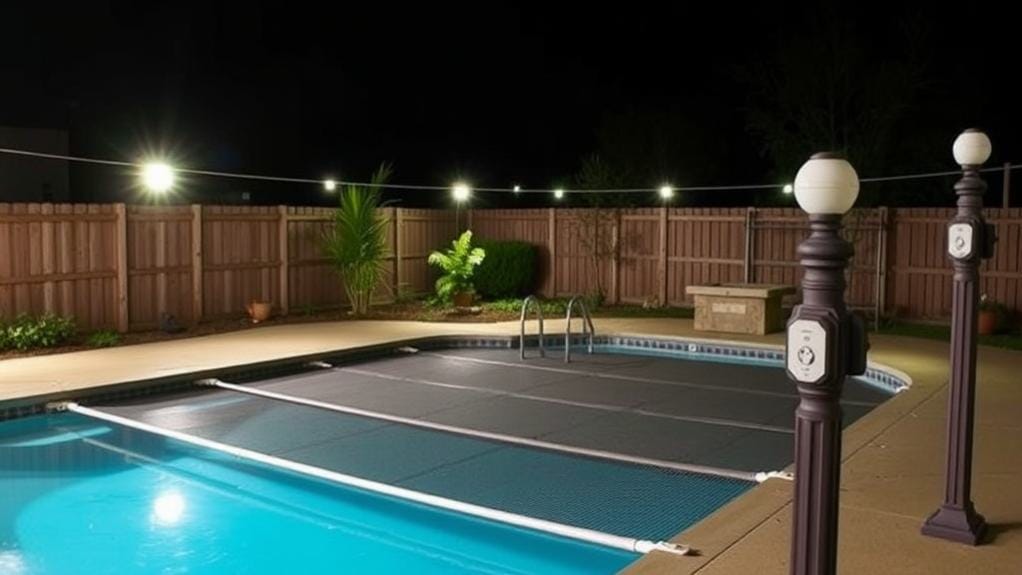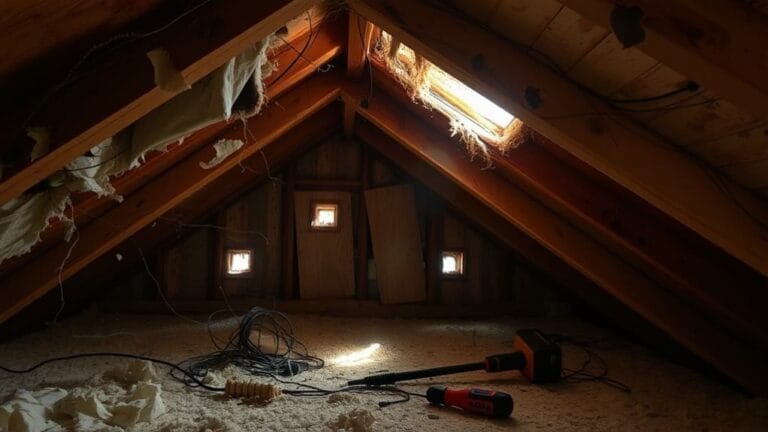If you've got a raccoon problem in your pool, don't panic – but also don't ignore it. These masked bandits can spread dangerous parasites like Baylisascaris procyonis through their droppings, which can cause serious health issues. First, shut down your pool immediately and grab disposable gloves. Remove visible waste with a wet vacuum (not your regular pool vac), then shock your pool with chlorine at 40 ppm. Run the filter for 24 hours and keep testing those water levels. You'll need proper barriers and deterrents to keep these night raiders away long-term. But that's just scratching the surface of what you need to know about handling these unwanted pool guests.
Understanding Baylisascaris Health Risks
Table of Contents
Anyone dealing with raccoons in swimming pools needs to understand the serious health risks posed by Baylisascaris procyonis, a dangerous roundworm parasite.
While different from dangerous possum diseases, raccoon parasites require similar caution and protective measures.
Let me be crystal clear: This isn't your average pool pest problem. When you're handling raccoon feces around your pool, you're potentially exposing yourself to a parasite that'll make you wish you'd paid attention to this warning.
These nasty roundworms can cause severe neurological problems if you accidentally ingest their eggs.
Pro Tip: *Those microscopic eggs can survive in pool areas for years. Yes, years.*
Here's what you're up against:
- Eggs that contaminate soil, water, and pool equipment
- Risk of serious brain and eye damage if infected
- Symptoms that start with nausea but can escalate to vision loss
Trust me – you don't want to play around with this one.
Signs of Pool Contamination

Now that you understand the health risks, spotting signs of raccoon contamination in your pool is your first line of defense.
Their urban adaptability and attraction to water sources make pools an irresistible target.
Let's face it – nobody wants raccoon poop in their swimming pool.
I'll help you identify the nasty evidence these masked bandits leave behind.
- Greenish-blue droppings near pool steps (Yep, that's definitely raccoon calling cards)
- Visible feces floating in the water (Gross, but you need to know)
- Suspicious deposits around the pool's edge (Don't ignore these "presents")
- Raccoon tracks or paw prints surrounding the pool (They're not here for a swim party)
- Live raccoon sightings near your pool (Time to play detective and check for contamination risk)
*Pro tip: Check these spots daily – especially those pool steps. These critters are creatures of habit and love marking their territory.*
Emergency Cleanup Protocol

Discovering raccoon contamination in your pool requires immediate action to protect everyone's health and safety.
Whether you've found a dead raccoon or just their unwelcome "presents," you need to act fast – and I mean right now. Consider contacting a wildlife professional who can check for nearby dens or entry points around your property.
First things first:
- Close that pool immediately – no exceptions!
- Grab those disposable gloves (don't even think about skipping this step)
- Remove any visible waste with a wet vacuum
Pro Tip: Your regular pool vacuum isn't the right tool for this job. Trust me on this one.
Next up:
- Crank up that chlorine to shock levels
- Give all surfaces a thorough cleaning
- Run your filter for at least 24 hours
- Backwash the system afterward
Remember: Those nasty Baylisascaris eggs are stubborn little monsters.
Chlorine alone won't cut it, so follow every step carefully. Your pool might be throwing a raccoon party, but you're about to crash it!
Pool Testing and Treatment

After clearing your pool of raccoon contamination, testing and treatment become your top priorities.
Let's face it – nobody wants to swim in raccoon soup! Like dealing with snake repellent effectiveness, regular monitoring is essential for safety and peace of mind. You'll need to monitor your water quality obsessively (yes, I mean obsessively) until you're confident it's safe again.
Here's your no-nonsense testing checklist:
- Check chlorine levels multiple times daily – those little bandits really mess with your chemistry
- Monitor pH and alkalinity like a hawk watching its prey
- Document every single test result (trust me, you'll thank me later)
- Shock treat the pool to SLAM levels – because regular chlorine won't cut it
- Backwash your filter system thoroughly – Baylisascaris eggs are stubborn little pests
*Pro Tip: Don't skimp on testing frequency. Even when things look clear, invisible nasties could be lurking. Better safe than sorry!*
Wildlife Prevention Strategies

While testing and treatment restore your pool's safety, preventing future raccoon visits should be your next focus.
Let's keep that wild animal from turning your backyard oasis into their personal water park.
Start by raccoon-proofing your yard:
- Remove obvious attractants like pet food and open garbage
- Install a sturdy fence around your pool (4-6 feet minimum)
- Add an underground barrier – these crafty critters love to dig
Creating a natural repellent barrier with garlic and chili powder around your pool area can provide additional protection against these persistent visitors.
Pro Tip: Motion-activated sprinklers are your new best friend. Nothing says "party's over" like an unexpected shower!
Don't even think about trying to trap and relocate them yourself.
It's illegal in many areas and trust me – you don't want a close encounter with an angry raccoon.
Instead, focus on prevention and pool covers. Your midnight swimmers will get the message and find somewhere else to splash around.
Safe Handling Procedures

For the health and safety of everyone involved, proper handling procedures are essential when dealing with raccoon contamination in your pool.
Let's be real – raccoon feces isn't exactly a pool party highlight, and it can carry Baylisascaris procyonis, a nasty parasite that doesn't mess around.
Here's your no-nonsense safe handling procedures checklist:
- Grab those disposable gloves – no exceptions, unless you enjoy parasitic infections
- Use a wet vac to remove the mess – don't get creative with pool nets here
- Crank up that chlorine to 40 ppm for 24 hours – yes, it's overkill, but so are raccoon parasites
- Backwash your filter system like your life depends on it (because it might)
- Wash those hands for 20 seconds minimum – singing "Happy Birthday" is optional but effective
Remember: These critters' leftovers can stay infectious for years.
Don't cut corners on safety.
Community Support Resources

Dealing with raccoon pool problems doesn't mean you're on your own. Trust me – there's a whole army of pool owners fighting the same furry battle.
I've found that joining forums like TFP (with its 400,000+ members) can be a game-changer when you're desperate for tried-and-true solutions.
Here's where to get backup:
- Contact local wildlife control agencies – they're the pros who know exactly how to handle your masked intruders
- Check CDC guidelines for proper pool cleaning (because nobody wants raccoon surprises in their pool)
- Join community workshops to learn prevention tactics from experts
- Connect with neighbors for a united front against wildlife invasions
*Pro Tip: Create a neighborhood group chat for real-time raccoon alerts. Yes, that's actually a thing – and it works!*
Long-Term Pool Protection Methods

A well-protected pool is your best defense against persistent raccoon visits.
Let's face it – pool owners dealing with a large number of raccoons need real solutions, not half-measures.
I'll show you exactly how to fortify your pool against these clever bandits.
- Install a sturdy fence that's actually secure (no, that wobbly old gate won't cut it)
- Set up motion-activated sprinklers – nothing says "get lost" like a surprise shower
- Invest in a solid pool cover – because your pool isn't a raccoon bathroom
- Remove all food sources and secure your garbage – they're opportunists, not picky eaters
- Call in the pros for regular monitoring – sometimes you need backup
*Pro Tip: Don't wait until raccoons make your pool their favorite hangout. Prevention beats cleanup every time!*
Frequently Asked Questions
Can Raccoons Contaminate Water?
Yes, I can confirm that raccoons seriously contaminate water through their feces, which contain dangerous parasites like Baylisascaris procyonis. These parasitic eggs aren't killed by chlorine and can cause severe health problems if you're exposed.
Why Do Raccoons Poop in My Pool?
Like marking their territory with graffiti, I'll tell you raccoons use your pool as their personal bathroom because it's convenient, cool, and close to their hangouts. They're drawn to water and aren't picky about cleanliness.
What Temperature Kills Raccoon Roundworm Eggs?
I can tell you that raccoon roundworm eggs die when exposed to temperatures above 60°C (140°F). While freezing below -10°C (14°F) may help, heat is your most reliable method for killing these eggs.
Are Raccoons Attracted to Pools?
Like moths to a flame, I can confirm that raccoons are absolutely attracted to pools. They'll use them for drinking, playing, and exploring. Your pool's a magnet for their curious nature and water-seeking habits.
Last Word
Look, dealing with raccoons in your pool isn't fun – it's about as pleasant as finding a spider in your shower. But I've shown you the essential steps to handle these masked bandits safely and protect your pool from future visits. You're now armed with the know-how to tackle contamination, enforce prevention measures, and maintain a raccoon-free zone. Stay vigilant and don't let these crafty critters turn your pool into their personal water park.








